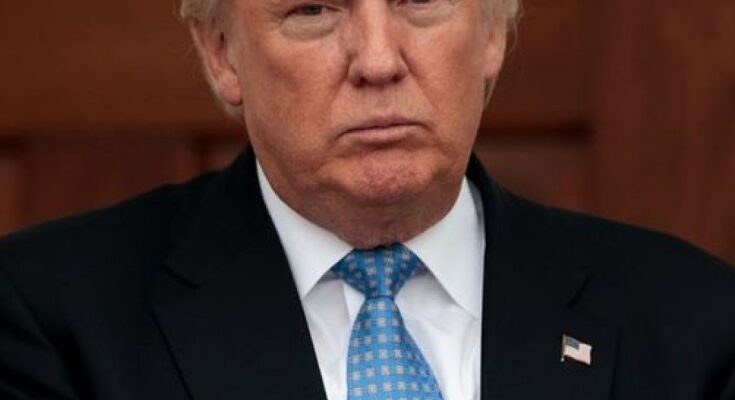Donald Trump Set a Presidential World Record, But It’s Not a Good One
The first few days of President Donald Trump’s second term have been turbulent, with his popularity and leadership facing hitherto unseen obstacles. Trump’s presidency started with a cloud of record unpopularity, paving the way for a controversial and widely watched government even though he won the November 2024 elections and claimed the “popular” vote in several crucial battleground states.

A Surprisingly Difficult Beginning
Record-Low Approval Ratings in a Gallup Poll
President Trump’s initial job approval rating is only 47%, according to a recent Gallup poll that highlights the extent of his unpopularity. Senior editor Megan Brenan, who worked on the study, emphasised the findings’ historical significance:
“President Donald Trump is once again below all other elected presidents since 1953, with his initial job approval rating for his second term at 47%, which is comparable to the initial 45% reading during his first term.”
Brenan went on:
“Trump’s most recent disapproval rating (48%) is three percentage points higher than in 2017, and he is still the only elected president with initial approval ratings below 50%.”
According to this data, Trump stands out among American presidents. Presidents usually have a “honeymoon period” with high approval ratings, which usually declines as their administration goes on. At the beginning of his administration, John F. Kennedy was still the most popular contemporary president. Dwight Eisenhower and Barack Obama were next, with Obama receiving 68% of the vote in 2009. Trump is significantly deviating from presidential norms, as evidenced by his approval ratings below 50% and his growing disapproval percentage.
The Unusual Approval Ratings for Trump

A significant difference between Trump’s approval ratings and those of his predecessors is highlighted by the Gallup poll. Trump’s first ratings are not only low but also accompanied by growing disfavour, in contrast to most presidents who experience a steady drop in popularity. Brenan clarifies:
“The majority of presidents have had a ‘honeymoon period,’ with high job approval ratings in the first few months of office that wane over time.”
Trump, however, contradicts this pattern:
Americans’ initial assessments of Trump are different from those of previous presidents in that they are far more likely to be critical of his performance than to be neutral.
This ongoing rejection raises concerns about the administration’s early policies and public perception and points to deeper polarisation and discontent among the American electorate.
Exodus of Celebrities: Prominent People Leaving the U.S.
Not only have the administration’s divisive policies impacted regular Americans, but they have also made well-known celebrities reevaluate living in the US. Actress Eva Longoria was one of the first to announce their desire to depart. Longoria expressed her worries to Marie Claire:
If he fulfils his promises, the area will be frightening. “I am fortunate,” she continued. “I get to go somewhere and escape.” Not all Americans are as fortunate. They will be stranded in this dystopian nation, and I feel sad and anxious for them.
In a similar vein, TV personality Ellen DeGeneres and her spouse, Portia de Rossi, have moved to the UK. The Wrap was informed by an unnamed person close to the couple:
“They are Cotswolds residents and have no plans to return to America, especially not while Trump is in power.”
These departures by well-liked individuals highlight the story of rising uneasiness and discontent among well-known Americans and highlight the societal fissures that Trump’s actions have deepened.
Public Attitude: A Split Nation
The political and social divisions that already existed in the US have gotten worse under Trump’s early presidency. His supporters applaud his dedication to undoing what they consider to be overly “woke” policies, highlighting a return to traditional values and military might. However, detractors contend that the policies of his administration impede social advancement and create a climate of fear and isolation.
The Public’s Polarisation
Defence and Military
The military’s operational readiness is intended to be strengthened by prioritising traditional warfighting skills above DEI projects. Supporters contend that this emphasis improves efficacy and efficiency by guaranteeing that funds are allocated to the most important defence goals. On the other hand, critics argue that disregarding DEI may result in lower morale, impeded innovation, and possible moral dilemmas in the military.
“It is a step backward for our nation and the military to eliminate DEI initiatives. Diversity and inclusivity are assets, not liabilities, according to Senator Bernie Sanders (D-VT).
Supporters, on the other hand, think that concentrating just on military preparedness will result in a more cohesive and disciplined force that is free from what they see as needless politicisation.
Global Relations and Immigration
Trump’s severe immigration policies have affected immigrant communities and damaged ties with neighbouring nations. These policies include mass deportations and limitations on asylum seekers. Celebrities like Eva Longoria and Ellen DeGeneres leaving represents a larger dissatisfaction among those who feel excluded by these measures, which might spark more social upheaval and draw criticism from around the world.
Senator John Cornyn (R-TX) said, “President Trump’s decisive action is a bold step in restoring order and security at our borders.”
In order to promote growth and lessen government involvement, the administration’s economic policies place a high priority on deregulation and assistance for established industries. These policies run the risk of widening societal gaps by ignoring the demands of marginalised people and escalating income inequality, even though they might help some sectors of the economy.
An economic analyst from the Brookings Institution said, “Removing millions of workers would cripple industries and devastate local economies that rely on their labour and contributions.”
The balance between presidential authority and congressional supervision is one of the major ethical and legal issues raised by Trump’s drastic policy changes.
There may be legal challenges to the renaming of military bases and the termination of DEI programs from people who claim that these acts contradict current laws or violate service members’ rights. The constitutionality of undoing policies put in place by prior administrations, particularly those that were a part of larger legislative initiatives to support diversity and inclusion, may be up to the courts to decide.
Professor Linda Garcia, a constitutional law expert at Georgetown University, pointed out that the administration’s efforts to undo long-standing policies might not stand up in court, especially if they are perceived as violating people’s rights and protections under federal law.
Moral Aspects to Take into Account
Many people view the reinstatement of traditional base names and the termination of DEI projects as unethical regressive actions that ignore and fail to correct historical injustices. Critics contend that these measures fail to foster an inclusive and courteous climate within the military and other government organisations and instead serve to widen rifts.
“Reverting to Confederate names is unethical because it ignores the terrible legacy of racism and division they represent,” Human Rights Advocate Dr. Emily Thompson said.
The Way Ahead: Juggling Tradition and Advancement
The difficulty for the Trump administration as it pursues its policy agenda is striking a balance between the need for advancement and diversity and the maintenance of traditional values and military preparedness. It takes careful evaluation of the long-term effects of policy changes and their influence on the military and society at large to achieve this equilibrium.
Combining Inclusivity and Operational Efficiency
Although the administration places a high priority on operational performance and combat preparedness, it is important to understand that diversity and inclusion can improve team chemistry and overall effectiveness. In high-stakes military operations, diverse teams can be extremely helpful since they contribute a range of perspectives and approaches to problem-solving.
Sensitivity in Handling Historical Legacies
Debates over historical memory and its function in modern society have been sparked by the decision to rename military installations connected to Confederate generals. Addressing these historical legacies with tact and a dedication to creating an atmosphere that recognises the achievements of all military members will be essential going ahead. This involves having candid discussions regarding the meaning of these symbols and how they affect the military community.
Possible Effects on US-Mexico Relations
The militarisation of the border and the Trump administration’s tough immigration policies have a big impact on US-Mexico ties. Mexico may perceive increased military presence at the border as coercive and unilateral, which might strain diplomatic relations.
Cooperation difficulties and diplomatic tensions
Mexico and the United States have long worked together on immigration and border security matters. Without thorough consultation, the deployment of more armed forces might cause diplomatic tensions and threaten current foundations for cooperation. To reduce tensions and preserve a positive relationship between the two countries, effective communication and cooperative tactics will be crucial.
These policies are putting our bilateral partnership to the test. In order to address the underlying reasons of migration, we need to collaborate to create sustainable and compassionate solutions,” said Ana María López, spokesman for the Mexican Ministry of Foreign Affairs.
Effects on Communities Across Boundaries
Communities on both sides are impacted by the heightened border militarisation, which upends cross-border exchanges and the economy that depend on them. Policies that meet the needs of these communities while upholding security goals are necessary because local workers, families, and companies that rely on the freedom of movement between the US and Mexico may encounter new difficulties.
“Retaining economic growth and guaranteeing the safety of the economy depend on a stable and cooperative relationship with Mexico.”
The Human Cost: Firsthand Narratives
The human accounts of people and families who have been significantly impacted by Trump’s immigration policies are hidden under the political rhetoric and policy discussions. Mass deportations and severe limitations have led to a humanitarian catastrophe that cuts across political lines and has a profoundly personal impact on people’s lives.
Families Split Apart
Fearing deportation, many undocumented immigrants reside in the United States with their families, contributing to their communities. By forcing parents and children to part ways and upsetting the lives of individuals who have made their home in the nation, the executive orders pose a threat to family unity.
“These policies cause unfathomable suffering for innocent children and split families apart. According to immigration advocate Maria Gonzalez, “no one should have to live in continual fear of being separated from their loved ones.”
Risky Vulnerable Populations
Particularly at risk are children born in the United States to undocumented parents. They would lose their identity and basic rights if their citizenship were to be revoked, rendering them stateless and disenfranchised.
“Every child has the right to understand their identity and place in the world. “Removing their citizenship is a tragic infringement on their human rights,” said child rights advocate Juan Ramirez.
Impact on the Community and Economy
The widespread expulsion of unauthorised immigrants may have serious economic and societal effects in addition to personal hardships. These people frequently play crucial roles in a range of sectors, including healthcare and agriculture, boosting the local economy and helping their communities.
According to Dr. Roberto Martínez, an economist who specialises in US-Mexico trade relations at the University of Texas, “removing millions of workers would cripple industries and devastate local economies that rely on their labour and contributions.”
The Emotional Reaction of Selena Gomez to Immigration Laws
On January 27, 2025, Selena Gomez expressed her displeasure with Trump’s recent executive actions targeting undocumented immigrants on Instagram in a powerful show of advocacy and empathy. Millions of people were immediately moved by the Mexican-American singer-songwriter’s poignant music video, which brought attention to the relationship between important social concerns and celebrity impact.
Gomez posted an incredibly moving video in the afternoon in which she read out the heartbreaking news of Trump’s plans to deport millions of immigrants while crying. Even though it was brief, her sincere appeal encapsulated the suffering endured by those who were most directly impacted by the administration’s policies.
“All my people, the children, are being attacked,” Gomez said, her voice quivering with grief.
She went on:
“I don’t comprehend. I apologise; I wish I could do anything, but I am unable to. I have no idea what to do. I swear, I’ll try everything.
Gomez made the decision to remove the original video shortly after it was posted, which only served to intensify the discussion surrounding her message. After the deletion, she posted another Instagram Story with the following caption over a dark screen:
“It seems that demonstrating empathy for others is unacceptable.”
This blatant declaration implied that Gomez was subjected to criticism or censorship because she tried to draw attention to the human cost of Trump’s immigration policy. Many followers speculated about the difficulties celebrities endure when speaking out against government policies because of the message’s ambiguity.
Public Response: Encouragement and Disapproval
Gomez’s tearful performance provoked a flurry of social media responses, illustrating the divisive character of the US immigration debate.
“I appreciate you giving people in pain a voice, Selena. We are really grateful for your sensitivity,” @CompassionForAll wrote.
“Gomez’s position is just what we need at the moment. Continue your fight for justice!@ImmigrantRightsNow tweeted.
Concerns about Censorship and Backlash
On the other hand, Gomez’s position was criticised by certain people and organisations who claimed that celebrities shouldn’t become involved in politics or that her intervention oversimplifies complicated legal concerns.
@PoliticalObserver said, “Celebrities should concentrate on their work, not try to dictate immigration policy.”
“There was needless drama in Gomez’s video. According to @NeutralVoice, “Let the government take care of its affairs.”
Concerns regarding censorship and the repression of dissenting voices, especially those of well-known people, were heightened by the comment she put after removing the video, which implied that demonstrating empathy is unacceptable.
The Court Case Concerning Citizenship by Birthright
The controversial topic of birthright citizenship is at the heart of President Trump’s immigration policy. Regardless of the immigration status of their parents, everybody born in the United States is granted citizenship under this legal principle, which has its roots in the 14th Amendment. This premise is being redefined by Trump’s executive order, which has sparked intense legal and constitutional discussions.
An explanation of the 14th Amendment
The United States’ 14th Amendment. Equal protection under the law and citizenship rights were established by the 1868 ratification of the Constitution. The first statement makes it clear that:
“Everyone who is born or naturalised in the United States and falls under its jurisdiction is a citizen of both the United States and the state in which they currently reside.”
Jus soli, a provision that guarantees citizenship to nearly everyone born in the United States, promotes a diverse and inclusive national identity.
By limiting automatic citizenship to children born in the United States to parents who are either U.S. citizens or lawful permanent residents, Trump’s executive order seeks to limit the application of jus soli. The following important clauses are included in the order:
Denying Documentation: Children born to undocumented immigrants or those on temporary visas are not eligible to receive or accept documents proving their U.S. citizenship from federal authorities.
30-Day Implementation Window: The order targets a certain group of children born in the United States and requires that the modifications be implemented within 30 days of its signing.
Targeted Demographics: Children of undocumented immigrants and anyone in the country on temporary visas, including students and temporary employees, are the main targets.
Legal Issues and Protections Under the Constitution
Birthright citizenship is strongly protected by the 14th Amendment, making any attempt to change or cancel it extremely controversial and legally risky. Regardless of parental status, constitutional scholars contend that the amendment clearly provides the right to citizenship based on birth in the United States.
Since jus soli is clearly protected by the constitution, Trump’s executive order is likely to be immediately and seriously challenged in court. Lawsuits claiming that the order overreaches the executive branch’s jurisdiction and violates the 14th Amendment are likely to be filed by advocacy groups, legal professionals, and civil rights organisations.
Human Rights Advocate Dr. Emily Thompson declared, “Any executive action that attempts to redefine birthright citizenship will be met with swift judicial intervention to preserve the constitutional rights enshrined in the 14th Amendment.”
According to Harvard University Constitutional Law Expert, “the attempt to redefine birthright citizenship through executive action is not only unlikely to succeed but also threatens to erode the foundational principles of American democracy.”
The Reaction of the Mexican Government
 Resources have been gathered by the Mexican government to aid the deportees, including:
Resources have been gathered by the Mexican government to aid the deportees, including:
Establishing facilities to house the arriving deportees, many of whom do not have immediate family support or resources in Mexico, is known as temporary housing and sheltering.
Legal Support and Advocacy: Ensuring that people seeking asylum or other types of relief are aware of their rights and alternatives under Mexican law by offering them legal support.
Healthcare and Social Services: Working with regional and global organisations to provide deported individuals with social and medical help that meets their physical and mental needs.
Since many people and families are taken from their communities by force without the necessary finances or help to start over in Mexico, the mass deportation of unauthorised immigrants presents serious humanitarian issues.
“These policies have a terrible human cost. Children are being taken from their parents, families are being uprooted, and people are being left without the resources to support themselves in a foreign place’, stated Michael Bryan, Director of Policy and Practice at Amnesty International.
The two neighbouring countries’ diplomatic ties are strained by the use of American military forces to enforce deportations. Unilateral acts and increased tensions have tarnished collaborative initiatives that formerly sought to better control immigration.
These policies are putting our bilateral partnership to the test. In order to address the underlying reasons of migration, we need to collaborate to create durable and compassionate solutions,” said Ambassador Carlos Morales, a former diplomat with a wealth of knowledge about US-Mexico relations.
Political and Public Responses
Trump’s policy changes have caused a variety of responses from various societal groups, which reflects the stark ideological differences in the US.
Senator John Cornyn (R-TX) said, “President Trump is bringing the country back to its core principles—defense, energy independence, and the principles that have made America great.”
Reversing DEI programs, according to supporters, will result in a more efficient and meritocratic military free from what they see as needless politicisation.Democrats’ and advocacy groups’ criticism
Democrats and other advocacy organisations, on the other hand, have fiercely criticised Trump’s policies, claiming that they thwart attempts to build a society that is more equal and inclusive. According to them, DEI initiatives are essential for tackling structural injustices and improving military performance by encouraging cooperation and a diversity of viewpoints.
“It is a step backward for our nation and the military to eliminate DEI initiatives. Diversity and inclusivity are assets, not liabilities, according to Senator Bernie Sanders (D-VT).
Sarah Johnson, a Democratic voter from Ohio, stated that “the immigration issue is extremely complex, and while I understand the need for security, we must also consider the humanitarian aspects and work towards comprehensive reform.”
On the other hand, another voter voiced a strong endorsement of the administration’s position:
Trump’s presidency will be greatly influenced by his ability to control the media and public opinion. Influencing public opinion and sustaining support depend heavily on the administration’s capacity to successfully convey its policies and combat unfavourable press.
In order to spread its message, the Trump administration has used a multipronged media strategy that makes use of both traditional and social media outlets. To reach a large audience, this involves direct communication via a variety of platforms, social media campaigns, and press briefings.
There are several obstacles to overcome when trying to control public opinion in the face of massive criticism. Advocacy organisations’ pushback, public demonstrations, and unfavourable media coverage can all weaken support and make the climate unfriendly for the execution of policies.
The administration may use media campaigns to emphasise the advantages of strict immigration enforcement and the reversal of DEI programs in order to counteract criticism by emphasising the achievements and favourable results of its policies.
Senator John Cornyn (R-TX) said, “President Trump’s decisive action is a bold step in restoring order and security at our borders.”
The road ahead is full of chances and challenges as President Trump makes his way through the first few days of his second term. The course of the administration’s presidency will depend on its capacity to resolve public concerns, properly oversee the implementation of policies, and heal the polarised gap.
“Immigration reform must be based on legislation that tackles the complex nature of the issue if it is to be successful and long-lasting,” said Senator Dick Durbin (D-IL).
Disapproval can be lessened by interacting with the public in a transparent manner and openly addressing their concerns. Enhancing the administration’s reputation requires fostering trust and proving that it is attentive to the demands of the people.
There will probably be fierce legal and legislative challenges to Trump’s executive actions, especially those that target immigration and birthright citizenship. The viability and legality of these measures will be determined in large part by court review and congressional monitoring.
With historically low approval ratings and rising dissatisfaction, Donald Trump’s presidency has faced many challenges. The country’s profound differences are highlighted by the departure of prominent personalities and the divisive public reaction. The future will include thoughtful policy considerations, strategic public involvement, and efforts to reconcile the nation’s fragmented terrain as the government navigates these initial hurdles.
Whether Trump can overcome these challenges and stabilise the public perception of his government will be determined in the upcoming months. His reputation as president will ultimately be shaped by the tenacity of his policies, his responsiveness to popular concerns, and his capacity to promote unity in the face of division.
What do you think about the effects of President Donald Trump’s initiatives on American society and his first approval ratings?

 “Our planet and the future of countless lives are in danger due to Trump’s rollback of climate policies,” stated Jane Smith, Director of the Environmental Defence Fund.
“Our planet and the future of countless lives are in danger due to Trump’s rollback of climate policies,” stated Jane Smith, Director of the Environmental Defence Fund.

